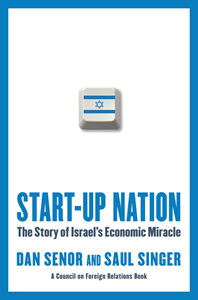 “The Story Of Israel’s Economic Miracle” can also become the story of how to launch/wildly succeed your own business. Dan Senor & Saul Singer answer the question, “How does a country of 7.1 million – surrounded by enemies, in a constant state of war since its founding, and with no natural resources – produce more start-up companies than large, peaceful, and stable nations like Japan, China, India, Korea, Canada and the UK?”
“The Story Of Israel’s Economic Miracle” can also become the story of how to launch/wildly succeed your own business. Dan Senor & Saul Singer answer the question, “How does a country of 7.1 million – surrounded by enemies, in a constant state of war since its founding, and with no natural resources – produce more start-up companies than large, peaceful, and stable nations like Japan, China, India, Korea, Canada and the UK?”
The authors have identified a number of key characteristics that can be translated to any business in any country:
Individual Generalists. Contrary to popular thinking, you want to endow your team with a variety of skills that allows them to understand and solve other areas of expertise. You want the brightest experts in a field working for you, but to make them even more valuable, they should be able to see how to solve other challenges in your company. Think about an artist who can fix your IT network, or a programmer who’s a marketing whiz.
Challenging The Status Quo. Israeli culture isn’t interested in preserving the status quo. They are constantly on vigil for new challenges to their country since their competition is evolving. Instead of being content following “best practices”, regularly question actions and results. This means that rigid hierarchical business models are flattened – anyone can question anyone else’s action, and everyone is responsible to sharing how and why they did what they did. By learning what’s working in a changing world, everyone in the culture wins, and everyone outside of the culture is never truly sure the response to their actions.
Empower People Early. In the Israeli military, after a short basic training, new soldiers are giving challenging missions and are expected to succeed. They quickly form teams, quickly analyze the problem, quickly given resources, and their results are measured (from all perspectives). Most businesses would never consider giving a new hire lots of responsibility (and a big chance to fail). But by empowering, you’re building strong teams quickly and truly valuing each team member’s ability to contribute.
Risk Is Good. Most larger companies are risk-averse. They’re looking to maintain their market share. But true growth can only come from taking wise chances. Be bold, study the competition well, and try. Afterwards, learn from the action and make sure everyone in your culture benefits.
Thanks to Michael Goodman for this book recommendation.